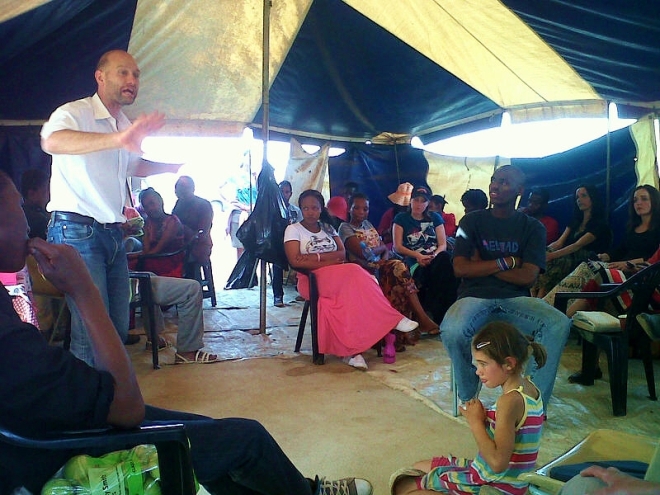
Outreach to Grace Baptist Church, Daveyton. Published on the Crystal Park Baptist Church blog.
I read an excellent article this morning written on the blog Township Reformation. In summary the writer makes the point that we need to plant Bible centric churches in the township because there is an absence of Bible centric churches. Consider this closing statement:
“Our townships not only need more churches, they are desperate for more churches. Churches that are biblical, confessional, and faithful. Not tossed to and fro by any wind of doctrine blowing in this land. Let us pray earnestly to God to raise a new generation that would plant such churches. Also, let us support brothers who are in process of planting or have already, by Gods grace, planted such churches” (TR).
Yet there are so many genuine obstacles to planting township churches one wonders how it may be achieved short of a miracle*. Consider first the competition any Evangelical work faces:
“The open areas [in townships] where we would play as kids have now been occupied by church tents… …Every school is packed with 3 or more churches using classrooms as places of worship on Sundays. This is on top of many old mainline churches that have existed for years… …and not forgetting the hip mega-churches that attract thousands of people from that same township.” (TR)
Then there’s the issue of finances. Now I get there’s financial diversity in the township. Shanty towns are very different to RDP towns which are as different to areas of bonded houses but a key constraint which Evangelical works face is finances. Actually all church plants face this problem alike but the issue is magnified and exponentially harder to overcome in areas where poor teaching regarding the People of God and their finances abound.
In fact, short of a miracle, it’s impossible to plant an Evangelical church into a township. Yet God is a God of miracles so I’d like to posit 3 ways we can answer the question “What can we do?”
1. We can pray
Even if our church isn’t already planting a church into a township we can speak to churches that are. Find out the name of the Pastor. Find out the location of the church. Commit them to pray in your services, in your prayer meetings in your personal devotions. Consider praying for Chris Mnguni at Grace Baptist Church in Daveyton. Or maybe John Ndhlovu at Cosmo City Baptist Church. God hears prayers, and while we remain silent is it any wonder that His Hand is stayed?
2. We can go
Nothing creates more opportunities for a Suburban pastor or congregant than getting a little township dust on their shoes. Once you’ve walked down a dusty street, had to fetch water from a dripping tap 50m away from where you’re working or used a smelly longdrop you quickly get a vision for the need and opportunity in the township. There’s nothing more powerful in a Suburban congregation than 5 people with a heart for a mission. There is a great cookie cut opportunity with an organisation called 3D-Outreach that you as a church might want to investigate. Check out we did here.
3. We can sacrifice
I mean it. Church planting into a township is a long term commitment. The challenges are huge. But the need is desperate. The Church, our church, your church, you in fact need to be prepared to sacrifice. For a limited time only we get to take the Gospel message out to a world that is dying without it. It is a great privileged to be used as an instrument of the almighty God as He goes about His work of calling in the lost sheep. When the time comes remember Paul’s pray for the Philippians,
“3 I give thanks to my God for every remembrance of you, 4 always praying with joy for all of you in my every prayer, 5 because of your partnership in the gospel from the first day until now. 6 I am sure of this, that He who started a good work in you will carry it on to completion until the day of Christ Jesus. 7 It is right for me to think this way about all of you, because I have you in my heart, and you are all partners with me in grace, both in my imprisonment and in the defense and establishment of the gospel. 8 For God is my witness, how deeply I miss all of you with the affection of Christ Jesus. 9 And I pray this: that your love will keep on growing in knowledge and every kind of discernment, 10 so that you can approve the things that are superior and can be pure and blameless in the day of Christ, 11 filled with the fruit of righteousness that comes through Jesus Christ to the glory and praise of God” (1:3 – 11).




